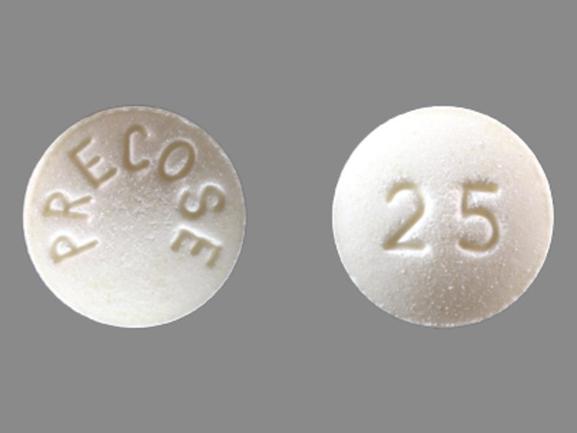Precose Side Effects
Generic name: acarbose
Medically reviewed by Drugs.com. Last updated on Mar 5, 2024.
Note: This document provides detailed information about Precose Side Effects associated with acarbose. Some dosage forms listed on this page may not apply specifically to the brand name Precose.
Applies to acarbose: oral tablet.
Common side effects of Precose
Some side effects of acarbose may occur that usually do not need medical attention. These side effects may go away during treatment as your body adjusts to the medicine. Also, your health care professional may be able to tell you about ways to prevent or reduce some of these side effects.
Check with your health care professional if any of the following side effects continue or are bothersome or if you have any questions about them:
More common
- abdominal or stomach pain
- bloated feeling or passing of gas
- diarrhea
Serious side effects of Precose
Along with its needed effects, acarbose (the active ingredient contained in Precose) may cause some unwanted effects. Although not all of these side effects may occur, if they do occur they may need medical attention.
Check with your doctor as soon as possible if any of the following side effects occur while taking acarbose:
Rare
- yellow eyes or skin
For healthcare professionals
Applies to acarbose: oral tablet.
General
The most frequently reported adverse events include abdominal pain, diarrhea, and flatulence.[Ref]
Gastrointestinal
- Very common (10% or more): Abdominal pain (19%), diarrhea (31%), flatulence (74%)
- Uncommon (0.1% to 1%): Nausea,, vomiting, dyspepsia
- Postmarketing reports: Ileus/subileus, pneumatosis cystoides intestinalis[Ref]
In large-scale clinical trials, a majority of patients have complained of gastrointestinal (GI) side effects. GI side effects usually developed within the first few weeks of therapy, were usually mild to moderate in severity, and typically decreased over time. The most common GI side effects were due to the fermentation of unabsorbed carbohydrates and resultant gas production. The severity of GI symptoms may be decreased by dosage reduction and by avoidance of gas-producing foods and sucrose.
There have been rare postmarketing reports of pneumatosis cystoides intestinalis associated with alpha-glucosidase inhibitors including this drug. If suspected, discontinue therapy and perform appropriate diagnostic testing.[Ref]
Hepatic
- Very common (10% or more): Serum transaminase elevations (14%)
- Postmarketing reports: Fulminant hepatitis with fatal outcome, jaundice and/or hepatitis and associated liver damage[Ref]
Treatment-emergent elevations of AST and ALT to greater the upper limit of normal, greater than 1.8 x ULN) and greater than 3 x ULN have been observed in 14%, 6%, and 3% of patients in studies of up to 12 months with doses up to 300 mg 3 times a day. The elevations were more common in women and generally asymptomatic and reversible. Additionally, these elevations appear to be dose-related.
International postmarketing experience: There have been 62 reports of of serum transaminase elevations to greater than 500 international units/liter, 29 were associated with jaundice. Of these 62 cases, 41 were receiving treatment with 100 mg 3 times a day or greater, 33 of 45 patients for whom weight was reported weighed less than 60 kg. In the 59 cases for which follow-up was provided, 55 had improvement or resolution of hepatic abnormalities with drug discontinuation, in 2 cases the hepatic abnormalities remained unchanged. Five cases of fulminant hepatitis with fatal outcome have been reported in Japan.[Ref]
Hematologic
- Frequency not reported: Small reductions in hematocrit
- Postmarketing reports: Thrombocytopenia[Ref]
Dermatologic
- Frequency not reported: Acute generalized exanthematous pustulosis[Ref]
Hypersensitivity
- Postmarketing reports: Hypersensitivity skin reactions (e.g. rash, erythema, exanthema, urticaria)[Ref]
Cardiovascular
Metabolic
- Frequency not reported: Hypoglycemia, low serum calcium, low plasma vitamin B6 levels[Ref]
This drug when administered as monotherapy should not cause hypoglycemia, but when administered with other agents, it may increase the potential for hypoglycemia. Low serum calcium and low plasma vitamin B6 levels were associated with use of this drug, however, they are thought to be spurious or of no clinical significance.[Ref]
References
1. (2001) "Product Information. Precose (acarbose)." Bayer
2. Cerner Multum, Inc. "UK Summary of Product Characteristics."
3. Cerner Multum, Inc. "Australian Product Information."
More about Precose (acarbose)
- Check interactions
- Compare alternatives
- Drug images
- Dosage information
- During pregnancy
- Drug class: alpha-glucosidase inhibitors
- Breastfeeding
Patient resources
Professional resources
Related treatment guides
Further information
Precose side effects can vary depending on the individual. Always consult your healthcare provider to ensure the information displayed on this page applies to your personal circumstances.
Some side effects may not be reported. You may report them to the FDA.

